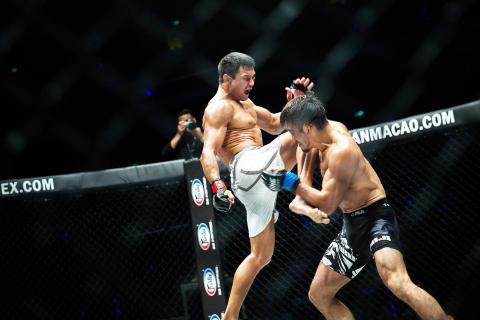Chatri Sityodtong was nine years old when his father took him to Bangkok’s Lumpinee Stadium for a Thai boxing fight. The fascination for rapid, hard-hitting martial arts never left him.
The Muay Thai-mad boy grew into Asia’s foremost promoter of mixed martial arts (MMA). His One Championship is becoming Asia’s biggest competitor to Ultimate Fighting Championship (UFC), the combat mashup that has built a global fan base. When UFC champion Conor McGregor was defeated last month by Floyd Mayweather in a high-profile Las Vegas boxing match, the bout reached one billion homes with an estimated pay-per-view take of US$700 million.
The success of UFC has made investors pay attention to a global sport that was once dismissed by US Senator John McCain in the 1990s as “human cockfighting.” Last year, brothers Frank and Lorenzo Fertitta sold the company that controls UFC to WME-IMG for an eye-popping US$4 billion. They bought UFC in 2001 for US$2 million.

Photo: Bloomberg
Three weekends before McGregor’s “Money Fight” showdown with Mayweather, Sityodtong was hosting his own show at the glitzy Venetian Macao in China. After shaking hands with fighters backstage he walked through a packed hall of 13,000 spectators to stand by the cage and watch his Kings and Conquerors show. The audience roared as Bibiano “The Flash” Fernandes made quick work of challenger Andrew Leone with a first-round rear-naked choke, giving the Brazilian bantamweight champion a record seven successful title defenses.
On Saturday, he was in Shanghai to promote his first event in the Chinese city, starring welterweight champion Ben Askren and Sweden’s Zebaztian Kadestam.
TOUGH TIMES
Sityodtong, 46, took a long detour to get here. The son of a Thai father and Japanese mother, he grew up as a middle-class kid in Bangkok. But his father’s property business collapsed during the 1997-98 Asian financial crisis.
Determined to rescue his family from poverty, he enrolled in Harvard Business School on loans and taught Muay Thai and delivered Chinese food to support himself and his mother. With no money or place to go, his mother secretly lived with him in his tiny dorm room. He later joined Maverick Capital, the hedge fund founded by Lee Ainslie, one of the so called “Tiger Cubs” who once worked for Julian Robertson’s Tiger Management. Sityodtong eventually founded his own shop with Izara Capital Management.
But his heart was still with the speed and spectacle of martial arts. When he turned 40 in 2011, the Muay Thai fighter and jiujitsu blue belt founded One Championship. Today, his Singapore-based firm is Asia’s largest league of MMA, a combination of boxing, wrestling, Brazilian jiujitsu and Muay Thai.
MMA has been the target of criticism both for allegedly inciting violence and hatred among fans and for the danger to contestants, including brain damage and in some cases death.
CODE OF HONOR
Sityodtong says he’s not out to copy UFC. His aim is to build the sport in Asia by adhering to the values that made the continent of 4.4 billion people the home of some of the best-known martial-arts stars like Bruce Lee (李小龍), Jackie Chan (成龍) and Jet Li (李連杰).
“UFC has a great marketing strategy that works for America — blood, violence, disrespect, anger, controversy, hatred among fighters, showcasing pure fighting,” Sityodtong said. “We are massively different. Martial arts is about courage, integrity, honor and respect.”
UFC declined to comment.
While cricket is huge in South Asia, soccer is the top sport in Southeast Asia, and baseball is popular in Japan, Sityodtong says martial arts is the pastime that unites the continent. This after all is the region that gave the world taekwondo from Korea, kung fu from China, karate from Japan and Muay Thai.
“There’s got to be a way to unify the entire continent and celebrate what is Asia’s greatest cultural treasure,”’ he said in an interview. “I want to make the first multibillion-dollar sports media property on a pan-Asia basis.”
He’s getting a little help from serendipity.
One day in early May, Sequoia India’s Managing Director Shailendra Singh was waiting for an elevator in Singapore when he bumped into Atin Kukreja, chief executive officer of Rippledot Capital and a business acquaintance. Kukreja had just met Sityodtong and he talked enthusiastically about what an exciting business the Thai entrepreneur was building.
Singh has a passion for martial arts and asked Kukreja for an introduction. A couple of weeks later, Singh and Sityodtong met for breakfast. Within two months, Sequoia was leading One Championship’s series C funding round, bringing the MMA company’s total fundraising to US$100 million. Other backers include Heliconia Capital Management, a unit of Singapore’s state investment company Temasek Holdings and Mission Holdings.
“We were immediately drawn to One Championship, which is having a shot at becoming one of the most prominent sports properties in Asia,’’ Singh said. “Sports media is going to monetize going forward. Ten years from now it will look dramatically different.”
Singh, who made early bets in successful start-ups like Go-Jek and Tokopedia, has been trying to figure out a way to invest in online videos as he expects media, entertainment and digital technologies to converge and dramatically change how talent connects with audiences. During the breakfast meeting, his ideas and questions got Sityodtong thinking.
“He spoke with such a clarity that it hit home to me,” Sityodtong said of Singh. “My mind was racing for the next few weeks.”
Singh, 41, will join One Championship’s board. And the company plans to launch OTT: Over-the-Top, with non-traditional, Web-based broadcasting as well as its own mobile app within six months. Other plans include entering Japan and Korea and deepening its presence in China and Southeast Asia in the next 12 months, according to Sityodtong, who is chairman and CEO. He said he plans ultimately to introduce virtual reality, so viewers can experience being in the cage with the fighters.
HOME CROWD ADVANTAGE
To win over Asian fans, One Championship is building up local fighters in each market. Its marketing campaigns involve depicting the personal stories of its fighters. They show lightweight world champion Eduardo Folayang’s rise as a Filipino national hero after overcoming poverty so dire that five siblings died of illnesses. And Aung La N Sang, who made history in July by becoming Myanmar’s first world champion in any sport.
“Human beings are tribal,” he said. “You want to follow and cheer for people who share the same background, culture and values.”
Sports media companies like UFC and One Championship typically make money by selling content to TV or digital platforms, often via pay-per-view, and through sponsorship and merchandising. One Championship’s event on Saturday in Shanghai could be viewed live for US$9.99. Sityodtong declined to disclose the company’s revenue but said it is still mainly from sponsors, including Disney, Marvel and Universal International Pictures.
He isn’t the only MMA promoter in Asia. In Japan, there are versions like Rizin Fighting Federation, Pancrase, Deep and Shooto. In China, local tournament Kunlun Fight holds regular bouts and South Korea has Top Fighting Championship.
But Sityodtong’s regional model appears to be working. One Championship events are now televised in 128 countries, up from 60 in 2014. Social media video views have soared to 600 million from 312,000 in 2014.
One Championship plans to hold 20 events this year, up from 14 last year. Sityodtong aims to eventually hold an event every week in Asia. UFC held only two events in the Asia Pacific region last year and plans to have five this year.
“My mission is to unleash superheroes who reignite the world with hope, strength, dreams and courage,” he said. “We’re just getting started.”

Growing up in a rural, religious community in western Canada, Kyle McCarthy loved hockey, but once he came out at 19, he quit, convinced being openly gay and an active player was untenable. So the 32-year-old says he is “very surprised” by the runaway success of Heated Rivalry, a Canadian-made series about the romance between two closeted gay players in a sport that has historically made gay men feel unwelcome. Ben Baby, the 43-year-old commissioner of the Toronto Gay Hockey Association (TGHA), calls the success of the show — which has catapulted its young lead actors to stardom -- “shocking,” and says

The People’s Republic of China (PRC) invaded Vietnam in 1979, following a year of increasingly tense relations between the two states. Beijing viewed Vietnam’s close relations with Soviet Russia as a threat. One of the pretexts it used was the alleged mistreatment of the ethnic Chinese in Vietnam. Tension between the ethnic Chinese and governments in Vietnam had been ongoing for decades. The French used to play off the Vietnamese against the Chinese as a divide-and-rule strategy. The Saigon government in 1956 compelled all Vietnam-born Chinese to adopt Vietnamese citizenship. It also banned them from 11 trades they had previously

Inside an ordinary-looking townhouse on a narrow road in central Kaohsiung, Tsai A-li (蔡阿李) raised her three children alone for 15 years. As far as the children knew, their father was away working in the US. They were kept in the dark for as long as possible by their mother, for the truth was perhaps too sad and unjust for their young minds to bear. The family home of White Terror victim Ko Chi-hua (柯旗化) is now open to the public. Admission is free and it is just a short walk from the Kaohsiung train station. Walk two blocks south along Jhongshan

Snoop Dogg arrived at Intuit Dome hours before tipoff, long before most fans filled the arena and even before some players. Dressed in a gray suit and black turtleneck, a diamond-encrusted Peacock pendant resting on his chest and purple Chuck Taylor sneakers with gold laces nodding to his lifelong Los Angeles Lakers allegiance, Snoop didn’t rush. He didn’t posture. He waited for his moment to shine as an NBA analyst alongside Reggie Miller and Terry Gannon for Peacock’s recent Golden State Warriors at Los Angeles Clippers broadcast during the second half. With an AP reporter trailing him through the arena for an